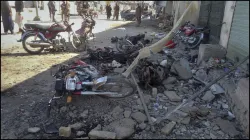Pakistan dismisses UN concerns of pre-poll violence despite twin blasts in Balochistan that killed 30
Pre-poll violence and targeting of election candidates and voters in different provinces are common features of Pakistan polls. The year is no different, as several independent candidates have been killed, provinces have been rocked by bomb blasts and Imran Khan's party is reeling under a crackdown.

Islamabad: Pakistan's Foreign Office on Wednesday dismissed concerns by UN human rights body about violence and the right to fundamental democratic freedom ahead of the general elections on Thursday, hours before the twin blasts in Balochistan that killed at least 30 people. The two bomb explosions at an election office of an independent candidate in southwest Pakistan injured 50 others.
Meanwhile, the Office of the UN High Commissioner for Human Rights (UN OHCHR) deplored “all acts of violence against political parties and candidates" and called on authorities to uphold the fundamental freedoms necessary for “an inclusive and meaningful democratic process". It pointed out that in the lead-up to the vote, there have been no less than 24 reported instances in which armed groups have staged attacks against members of political parties.
"Pakistan’s democratic gains over the past 15 years have been hard-won in the face of many security and economic challenges. Elections are an important moment to reaffirm the country’s commitment to human rights and democracy, and to ensure the right to participation of all its people, including women and minorities,” UNHCHR spokesperson Liz Throssell said in the statement.
Reacting to the statement, Pakistan's Foreign Office spokesperson Mumtaz Zahra Baloch said the country has finalised the security plans as per its electoral laws. "Pakistan is fully committed to fostering an inclusive democratic process, upholding the rule of law and protecting human rights and fundamental freedoms guaranteed in its laws and Constitution," she said.
She said that the security plans have also been finalised to hold the February 8 polls, adding that Pakistan's judicial system provides for fair trial and due process, reported Geo News. "Domestic legal remedies are available in case of any complaints in the electoral process," she added
Terror attacks in Pakistan
The elections for 2024 are no different from previous polls as all of them have witnessed significant violence, including gun attacks and bombings targetting candidates and voters. Several candidates of the he Pakistan Tehreek-e-Insaf (PTI), Pakistan Peoples Party (PPP), National Party (NP), Jamiat Ulema-e-Islam-Fazl (JUI-F) and Pakistan Muslim League-Nawaz (PML-N) have been targeted.
The Election Commission of Pakistan (ECP), last month, postponed the elections on the National Assembly's NA-8 and Khyber Pakhtunkhwa's PK-22 constituencies after independent candidate Rehan Zaib Khan was gunned down in KP’s Bajaur district.
The UN statement also said the human rights body was disturbed by the “pattern of harassment, arrests and prolonged detentions of leaders of the Pakistan Tehreek-e-Insaaf (PTI) party and their supporters" and noted the multiple legal cases against Imran Khan, his disqualification and conviction to long prison terms.
“We expect the higher courts will carefully review these conclusions in line with applicable due process and fair trial rights, and Pakistan’s wider international human rights obligations. All eligible parties must be able to compete fairly,” Throssell said.
Twin blasts in Balochistan
In Balochistan, the first of the two blasts took place at the office of an independent election candidate in Pishin district, killing 12 people. The second explosion in Qilla Saifullah, a town near the Afghan border, detonated near an office of Jamiat Ulema Islam (JUI), a religious party that has previously been the target of militant attacks, according to the province's information minister.
Several groups, including the Islamist militant Pakistani Taliban and separatist groups from Balochistan, oppose the Pakistani state and have carried out attacks in recent months. The bombings came despite the deployment of tens of thousands of police and paramilitary forces across Pakistan to ensure peace following a recent surge in militant attacks in the country, especially in Balochistan.
The gas-rich Baluchistan province at the border of Afghanistan and Iran has been the scene of a low-level insurgency by Baluch nationalists for more than two decades. Baluch nationalists initially wanted a share of the provincial resources, but later they initiated an insurgency for independence. Pakistani Taliban and other militant groups also have a strong presence in the province.
ALSO READ | Pakistan Elections 2024: Caretaker govt considering suspension of internet services on polling day